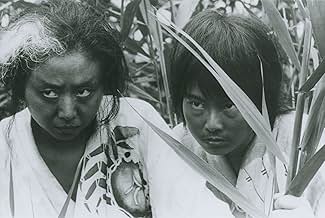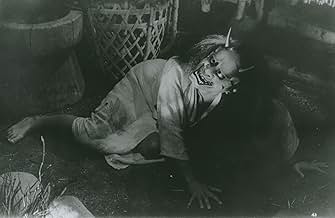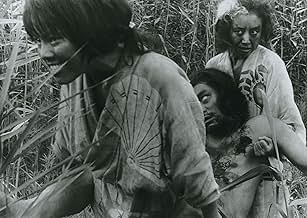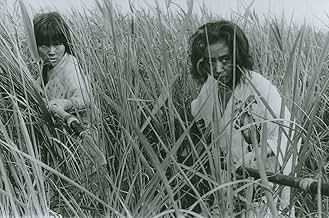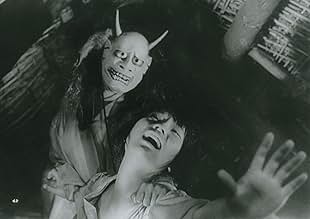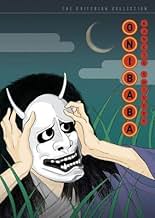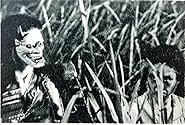VALUTAZIONE IMDb
7,9/10
24.403
LA TUA VALUTAZIONE
Due donne uccidono i samurai e vendono i loro averi per vivere. Mentre uno di loro ha una relazione con il vicino, l'altra donna incontra un misterioso samurai che indossa una maschera bizza... Leggi tuttoDue donne uccidono i samurai e vendono i loro averi per vivere. Mentre uno di loro ha una relazione con il vicino, l'altra donna incontra un misterioso samurai che indossa una maschera bizzarra.Due donne uccidono i samurai e vendono i loro averi per vivere. Mentre uno di loro ha una relazione con il vicino, l'altra donna incontra un misterioso samurai che indossa una maschera bizzarra.
- Regia
- Sceneggiatura
- Star
- Premi
- 2 vittorie totali
Recensioni in evidenza
Wow,I saw this movie on Cable recently.Both of the women in this story are just trying their best to get by and survive in a bad situation.I could tell it was on a limited budget but very well written.It was erotic with frontal nudity and even filmed in the 60's.It had me on the edge of my seat the whole time.I was trying to figure out where they were going with the whole thing.I kept trying to decide if I sympathized with the old woman more than the young one.Then at the end I felt sorry for both of them.What a great story.This one needs to be on Cable more often.This one is a must see even for people who only like contemporary films.I would recommend it to anyone.
Onibaba is a very well done film, purposefully using black and white cinema to its' advantage in this stunning portrayal of murder, jealousy, and uncontrollable human instinct in a dark period of Japan's history.
A film that aims at portraying the baser side of human nature and investigating human psychology, it is chalk-full of symbolic scenes and sequences. From start to finish it draws you in with the odd imagery and scenery of Japan's rural areas, and even though in this film though there are very few characters and elements that are to it, both visually and literally, through its' minimalism it effectively tells its' story.
This film is both very artistic & symbolic as well as literal and upfront, juxtaposing very graphic, real images of the face of humanity that demand the viewer to infer much throughout the whole of the film. When going into this film, I would say that it is very important for the viewer to think of the film as being very symbolic for the instincts and base nature of mankind, and perhaps even a 'state of nature' portrayal of humanity. If you watch this film with that in mind, it will help with the inferences that one must make to get the most out of this film.
As it stands by itself, aside from the deeper meaning, it is an intriguing story that is a veritable 'slice of life' film in the darker sense, viewing the way that people had to live during a period of war and hard times in feudal Japan. It deals with the hardships that these people face, and their method of survival, in addition to a very human story of jealousy and portrayal with a very interesting culminating point that I did not expect at all. The climax of the film is very much worth the build-up, though at times it seemed to be rather slow.
Overall, a very important piece of film when it comes to the symbolism and techniques employed. Through its' minimalism and black-and-white cinematography we are really treated to a great film that is, of its' own right, an influential and great movie. The cinematography is exceptionally good, especially the use of the reeds and the light at night.
I would recommend this film to anybody with a serious interest in film, as well as anybody who likes a good film that investigates the darker side of human nature.
A film that aims at portraying the baser side of human nature and investigating human psychology, it is chalk-full of symbolic scenes and sequences. From start to finish it draws you in with the odd imagery and scenery of Japan's rural areas, and even though in this film though there are very few characters and elements that are to it, both visually and literally, through its' minimalism it effectively tells its' story.
This film is both very artistic & symbolic as well as literal and upfront, juxtaposing very graphic, real images of the face of humanity that demand the viewer to infer much throughout the whole of the film. When going into this film, I would say that it is very important for the viewer to think of the film as being very symbolic for the instincts and base nature of mankind, and perhaps even a 'state of nature' portrayal of humanity. If you watch this film with that in mind, it will help with the inferences that one must make to get the most out of this film.
As it stands by itself, aside from the deeper meaning, it is an intriguing story that is a veritable 'slice of life' film in the darker sense, viewing the way that people had to live during a period of war and hard times in feudal Japan. It deals with the hardships that these people face, and their method of survival, in addition to a very human story of jealousy and portrayal with a very interesting culminating point that I did not expect at all. The climax of the film is very much worth the build-up, though at times it seemed to be rather slow.
Overall, a very important piece of film when it comes to the symbolism and techniques employed. Through its' minimalism and black-and-white cinematography we are really treated to a great film that is, of its' own right, an influential and great movie. The cinematography is exceptionally good, especially the use of the reeds and the light at night.
I would recommend this film to anybody with a serious interest in film, as well as anybody who likes a good film that investigates the darker side of human nature.
"Battle not with monsters, lest ye become a monster, and if you gaze into the abyss, the abyss gazes also into you."
The characters in Onibaba dwell in the bottom rung of Maslow's Pyramid.
Food, sex, shelter, survival - though not necessarily in that order.
Sexuality permeates every frame of this film. It is ever-present along with the oppressive heat and the marshland weeds.
The stark black and white cinematography perfectly captures the desolate mood.
The score – atonal free jazz backed by tribal rhythms - though completely anachronistic works surprisingly well.
One of the most fiercely primal depictions of the human condition on celluloid, Onibaba is a hauntingly erotic masterpiece.
- Nietzsche
The characters in Onibaba dwell in the bottom rung of Maslow's Pyramid.
Food, sex, shelter, survival - though not necessarily in that order.
Sexuality permeates every frame of this film. It is ever-present along with the oppressive heat and the marshland weeds.
The stark black and white cinematography perfectly captures the desolate mood.
The score – atonal free jazz backed by tribal rhythms - though completely anachronistic works surprisingly well.
One of the most fiercely primal depictions of the human condition on celluloid, Onibaba is a hauntingly erotic masterpiece.
This particular flick caught my attention with the box description of
"an old woman and her nubile young daughter lure unwary samurai into a
wheatfield to rob and kill them." Well, there wasn't much luring...most
of the samurais were just unlucky enough to wander into the old woman
and nubile young daughter's home territory...but the movie was still a
superb little find...in a suburban Blockbuster Video, of all places!
This movie, which I found to be faster paced than most Japanese period
pieces, is just DRIPPING with weird psychological overtones. The story
involves an old woman and her daughter-in-law living off the spoils of
wars. Various samurai from countless wars are always stumbling into
these bandits' territory and to be summarily jacked for their armor and
weapons. It's one big happy family until an old comrade of the
daughter's husband returns home and reports that the daughter's husband
is dead. We're never really sure if this man killed the husband or
not...but that issue is soon is overshadowed by the sexual tension of
two women who haven't been with a fella for some time. Eventually, the
nubile young daughter helps herself to this new lover, much to the
jealous rage of her mother-in-law. So the old woman hatches a scheme to
separate these two lovers...but keeping them apart is as difficult as
keeping apart two dogs in...well, you get the idea.
The cinematography of this film is excellent. Each shot is meticulously
and lovingly shot, building the tension and supplying the canine
symbolism. The music is unusual too...it starts off with some hepcat
bebop and then regresses into what I can only guess is theme music for
an oni (Japanese ogre).
I would highly recommend Onibaba for those evenings where everyone
feels a need to be disturbed and entertained at the same time. It also
doesn't hurt that Jotsuki Yoshimuru, who plays the daughter-in-law,
happens to be drop dead gorgeous...in a punk rock sort of way. You'll
see what I mean when you check out this flick.
I doubt you'll find this flick at Blockbuster Video...unless you find
one in the middle of a wheat field.....
To describe this film in one word, that word would have to 'wow', or something to that effect. In short, Onibaba is an absolutely spectacular cinematic spectacle, and one that has few equals in it's field. In fact, it's the perfect fusion between art-house cinema and atmospheric horror! Loosely based on a Buddhist fable, Onibaba tells a story of lust, envy, wrath and betrayal which is wrapped up by way of a hideous demon mask. Onibaba is a human drama before it's a horror movie - all the character actions are driven by their various needs and wants, and the all the comeuppance emancipates from there. The characters and their actions are constantly fascinating, and it's that which predominantly keeps the film alive. We follow a mother and her daughter-in-law; a couple that are forced to eke out an existence in war torn Japan by killing passing samurai's and selling their belongings for food. Their existence is upset one day, however, when the son's friend, Hachi, returns from the war to the place where the two women live.
The title of the film roughly translates into English as 'demon woman', and that is an apt title for this story. Although the film doesn't contain any actual demons or other mythical creatures, the real horror comes from the character actions and the film succeeds as a horror film in that way. The atmospheric location, which consists of a huge area covered in reeds, adds weight to film's claim to the horror genre also and the location provides a truly stunning set for this story to take place. The film also features a dark pit, which the women use to dump the bodies of the Samurai they kill, which adds to the fantasy and inventive element of the story. The film is cinematic poetry on many levels, from the bleak yet beautiful cinematography, to the elements of the location mentioned - all the way down to it's central piece of imagery - the mask itself. The mask is the film's centrepiece, and the part's where it features are the most memorable of the movie.
Prolific Japanese director Kaneto Shindô takes us on a tour-de-force of atmospheric direction. He spends a fair amount of time focusing on the reeds blowing in the wind and many of his angles focus on the sky, which will no doubt irritate the less adept viewers amongst us - but the rest of us know that this is a way for Shindô to aptly portray his setting, and every instance when he did that was a delight for yours truly. There are many great shots in this movie, and if you're a fan of technical prowess, Onibaba is your film; and even if you're not, this film is a must see.
The title of the film roughly translates into English as 'demon woman', and that is an apt title for this story. Although the film doesn't contain any actual demons or other mythical creatures, the real horror comes from the character actions and the film succeeds as a horror film in that way. The atmospheric location, which consists of a huge area covered in reeds, adds weight to film's claim to the horror genre also and the location provides a truly stunning set for this story to take place. The film also features a dark pit, which the women use to dump the bodies of the Samurai they kill, which adds to the fantasy and inventive element of the story. The film is cinematic poetry on many levels, from the bleak yet beautiful cinematography, to the elements of the location mentioned - all the way down to it's central piece of imagery - the mask itself. The mask is the film's centrepiece, and the part's where it features are the most memorable of the movie.
Prolific Japanese director Kaneto Shindô takes us on a tour-de-force of atmospheric direction. He spends a fair amount of time focusing on the reeds blowing in the wind and many of his angles focus on the sky, which will no doubt irritate the less adept viewers amongst us - but the rest of us know that this is a way for Shindô to aptly portray his setting, and every instance when he did that was a delight for yours truly. There are many great shots in this movie, and if you're a fan of technical prowess, Onibaba is your film; and even if you're not, this film is a must see.
Lo sapevi?
- QuizOnibaba's literal meaning is demon hag or old devil woman.
- BlooperWhen the two soldiers get off their horses and start fighting in the river, the audio of the water splashing goes on and off. In addition, when the swords clash, there is no sound of clanging heard.
- Versioni alternativeOriginally cut in England when released in 1968, though the video releases are uncut.
I più visti
Accedi per valutare e creare un elenco di titoli salvati per ottenere consigli personalizzati
- How long is Onibaba?Powered by Alexa
Dettagli
Botteghino
- Lordo in tutto il mondo
- 689 USD
- Tempo di esecuzione
- 1h 43min(103 min)
- Colore
- Mix di suoni
- Proporzioni
- 2.35 : 1
Contribuisci a questa pagina
Suggerisci una modifica o aggiungi i contenuti mancanti


